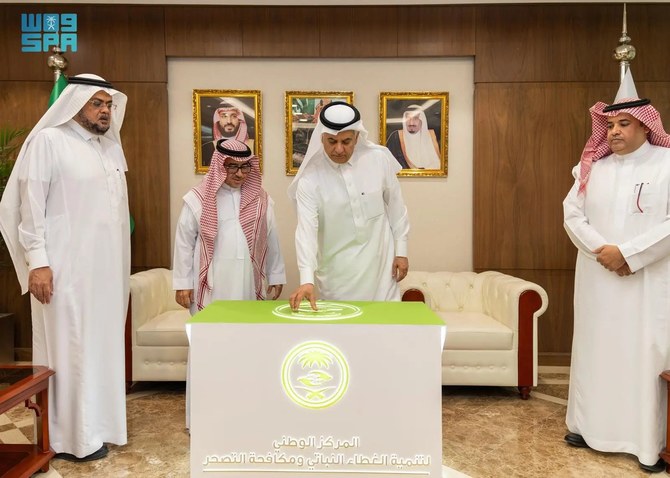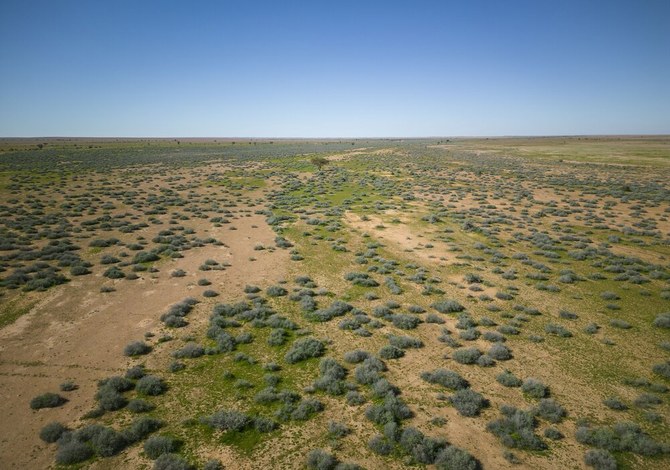RIYADH: Saudi Minister of Environment, Water and Agriculture Abdulrahman Al-Fadhli has launched an initiative to revitalize 100 natural parks across the Kingdom, covering more than 225,000 hectares in its initial phase.
The initiative involves planting more than 12 million wild trees and shrubs in the targeted areas, fostering environmental sustainability and enhancing quality of life, aligning with the goals of Saudi Vision 2030 and the Saudi Green Initiative.
The Kingdom’s National Center for Vegetation Cover Development and Combating Desertification oversees various tasks within the initiative, including raising awareness about the significance of natural parks.
The center emphasizes the need for park preservation, protection, monitoring and data collection, as well as creating planting maps for local trees and shrubs such as acacia, wild sidr and haloxylon.
The center will also cultivate and sow seeds in the parks, engage the community and offer employment opportunities.
Natural parks store carbon, combat climate change, prevent desertification and support diverse plant and animal life through innovative rehabilitation and development methods.
They offer economic prospects through beekeeping, boost honey production, attract tourists and serve as a recreational destination for families and locals.
The center focuses on restoring and preserving vegetation, managing pastures, forests and national parks, detecting encroachments, combatting illegal logging and safeguarding natural resources and biodiversity.
Meshal Al-Harbi, general manager of the General Department of Pastures at the center, said: “Activities aimed at rehabilitating the natural parks involve planting trees and sowing seeds based on plant environments and protective methods.”
“One of the methods for rehabilitating natural parks involves the utilization of rainwater harvesting techniques to store and utilize this water,” he said.
Al-Harbi said: “The natural parks are good habitat for wildlife. It is characterized by good water-borne soil suitable for the growth of seasonal or sustainable plants. It also stores carbon and is considered a good environment for recreation and camping.
“In light of the implementation of the initiative, I expect that this would result in reducing dust storms and increasing vegetation cover, thus contributing to carbon storage and reducing temperature.”
12m trees to transform Kingdom’s parks
https://arab.news/mrtn5
12m trees to transform Kingdom’s parks

- Ministry launches project to revitalize 100 natural parks
- The center emphasizes the need for park preservation, protection, monitoring and data collection
New platform, pavilion inaugurated at Prophet’s biography museum in Madinah

RIYADH: A new pavilion and an interactive digital platform have been inaugurated at the International Fair and Museum of the Prophet’s Biography and Islamic Civilization in Madinah.
The new additions to the museum were inaugurated by Prince Salman bin Sultan, Governor of Madinah, in the presence of Mohammad Al-Issa, Secretary-General of the Muslim World League and Supervisor-General of the museum.
The new pavilion offers a documented presentation of Madinah through more than 20 sections, covering the most important historical, cultural, and social monuments and landmarks of the holy city during the era of the Prophet Muhammad.
It also includes a panorama of the Prophet's Chamber and presents a simulation of the construction of the Prophet's Mosque, the Prophetic medicine tent, and the Prophet's daily routine.
Ethaf, the new digital platform, allows visitors to explore the Prophet’s biography through virtual tours, with access to a library of over 350 books and encyclopedias in the service of the Holy Qur’an and the Prophetic Sunnah, translated into several languages.
The governor also visited the pavilion showcasing the Kingdom's efforts in serving Qur’an, Sunnah, and the Two Holy Mosques, and was briefed on its work and efforts to highlight the message of Islam.
Saudi aid agency and UK government sign $10m agreement for cholera response in Yemen

- KSrelief will provide $5m to the WHO, while the UK government will provide a further $5m to the UN Children’s Fund
- An estimated 3.5m people will benefit from the deal to fund a wide range of disease management and prevention services
LONDON: Saudi aid agency KSrelief and the UK’s Foreign, Commonwealth and Development Office on Monday signed an agreement to expand cholera response efforts in Yemen, potentially benefiting an estimated 3.5 million people.
KSrelief will provide $5 million to the World Health Organization, while the UK government will provide a further $5 million to the UN Children’s Fund. The money will help support emergency cholera-response activities in Yemen’s worst-affected provinces.
The WHO will deliver a range of services to tackle cholera, including leadership and coordination expertise, disease surveillance, rapid-response teams, and management of cases. KSrelief will assist these efforts through infection-prevention and control efforts, water sanitation and hygiene improvements, risk communication, community engagement, and oral cholera-vaccination campaigns.
The UK funding will be used to tackle water sanitation, hygiene, and health interventions in the most contaminated and high-risk areas.
The agreement was signed in London by Abdullah Al-Rabeeah, supervisor general of KSrelief, and Jenny Chapman, minister of state for international development at the Foreign Office, during the former’s official visit to the UK.
Saudi interior ministry announces penalties for unauthorized Hajj Pilgrims and facilitators

- Penalties will apply from Tuesday until approximately June 10
RIYADH: Saudi Arabia’s Ministry of Interior has announced penalties for individuals who violate Hajj permit regulations and those who facilitate such violations.
The ministry said the following penalties would apply from Tuesday until approximately June 10.
A fine of up to SR20,000 ($5,331.43) will be imposed on individuals caught performing or attempting to perform Hajj without a permit, and on holders of all types of visit visas who attempt to enter or stay in Makkah city and the holy sites during the specified period.
A fine of up to SR100,000 will also be imposed on anyone who applies for a visit visa for an individual who has performed or attempted to perform Hajj without a permit, or who has entered or stayed in Makkah city and the holy sites during the specified period. The fine will multiply for each individual involved.
The same fine will apply to anyone who transports or attempts to transport visit visa holders to Makkah city and the holy sites during the specified period, as well as to those who shelter or attempt to shelter visit visa holders in any accommodation, including hotels, apartments, private housing, shelters, or housing sites for Hajj pilgrims.
This includes concealing their presence or providing assistance that enables their stay. The fine will multiply for each individual sheltered, concealed, or assisted.
A separate penalty would also apply to illegal infiltrators attempting to perform Hajj, whether residents or overstayers, and the guilty parties would be deported to their countries and banned from entering the Kingdom for ten years.
Lastly, the ministry said the relevant court will be requested to confiscate land vehicles used to transport visit visa holders to Makkah city and the holy sites during the specified period, if owned by the transporter, facilitator, or any accomplices.
Turning a dream into reality: retired Saudi teacher copies Qur’an by hand in inspiring journey

- Al-Zahrani shared with Arab News that the experience was both demanding and humbling, requiring exceptional precision and unwavering concentration, as copying the Qur’an allowed no margin for error
MAKKAH: In an era of rapid technological change and evolving traditions, some individuals still embody steadfast devotion to craftsmanship and the quiet power of creativity.
Among them is retired teacher Khaled Al-Zahrani, who turned his retirement into a journey of fulfillment by realizing a dream he had cherished since his college days — copying the entire Holy Qur’an by hand in his own script.
Al-Zahrani, who is nearly 60, has a lifelong passion for Arabic calligraphy, especially the naskh and ruq’ah scripts. He had dreamed of hand-copying the Holy Qur’an since his university days. However, the demands of work and daily life postponed his ambition until retirement gave him the opportunity to finally turn his dream into reality.
HIGHLIGHTS
• Al-Zahrani shared with Arab News that the experience was both demanding and humbling, requiring exceptional precision and unwavering concentration, as copying the Qur’an allowed no margin for error.
• He explained that the experience strengthened his bond with the Qur’an, deepening his connection to its message while instilling a profound sense of responsibility toward the sanctity of the words he transcribed.
He explained that his journey truly began when a friend introduced him to the Qur’an by Hand initiative, which provides blank copies of the Qur’an for personal transcription. Inspired, he purchased two copies and embarked on his endeavor.
Al-Zahrani shared with Arab News that the experience was both demanding and humbling, requiring exceptional precision and unwavering concentration, as copying the Qur’an allowed no margin for error.
He carefully transcribed around two or two-and-a-half pages each day, meticulously counting the letters to ensure a balanced layout and to avoid omitting any verses.
He began with Surah Al-Zalzalah as a test of his abilities and, upon completing it, he gained the confidence to move forward, despite the profound sense of awe he felt when starting the lengthy Surah Al-Baqarah.
Al-Zahrani said that he relied on a standard half-millimeter pen and used an eraser or a fine needle to make corrections when needed, although he was meticulous to minimize errors as much as possible.
He explained that he had to devote himself fully to this work, so he decided to seclude himself in his home for six months — avoiding all distractions and social visits — so that he could finish writing the Holy Qur’an in conditions that would help him concentrate and achieve his goal.
Al-Zahrani said that his project remained out of the public eye until a relative filmed him writing and posted the video in a family WhatsApp group. The video quickly went viral, drawing widespread admiration and attention.
He added that while he received numerous requests for media interviews, he chose to delay them until he had fully completed the Qur’an, emphasizing that a task of such significance required unwavering focus and could not afford any distractions.
Al-Zahrani said that his transcription of the Qur’an was far more than an artistic pursuit or personal project: It was a profound spiritual journey that drew him into deep contemplation of God’s verses and their meanings. Every letter he penned resonated within him, as if he were living and interacting with the words themselves.
He explained that the experience strengthened his bond with the Qur’an, deepening his connection to its message while instilling a profound sense of responsibility toward the sanctity of the words he transcribed.
He also expressed the hope that his work would inspire younger generations to reconnect with the art of Arabic calligraphy, not simply as an aesthetic pursuit but as a powerful means of drawing closer to and honoring the Qur’an.
Al-Zahrani believes that his experience taught him profound lessons in patience and perseverance, calling it one of the most meaningful chapters of his life.
He expressed hope that his story would inspire others with long-delayed dreams to take the first step toward realizing them, no matter how late it may seem, proving that with sincere determination, dreams can indeed become reality.
Saudi project clears 1,488 Houthi mines in Yemen

- The demining operations took place in Marib, Aden, Jouf, Shabwa, Taiz, Hodeidah, Lahij, Sanaa, Al-Bayda, Al-Dhale and Saada
RIYADH: Members of Saudi Arabia’s Project Masam removed 1,488 explosive devices from various regions of Yemen last week.
The total included 1,437 unexploded ordnances, 46 anti-tank mines, three anti-personnel mines and two explosive devices, according to a recent report.
Ousama Al-Gosaibi, the initiative’s managing director, said that 490,144 mines have been cleared since the project began in 2018.
The explosives were planted indiscriminately and posed a threat to civilians, including children, women and the elderly.
The demining operations took place in Marib, Aden, Jouf, Shabwa, Taiz, Hodeidah, Lahij, Sanaa, Al-Bayda, Al-Dhale and Saada.
The project trains local demining engineers and provides them with modern equipment. It also offers support to Yemenis injured by the devices.
Teams are tasked with clearing villages, roads and schools to facilitate the safe movement of civilians and delivery of humanitarian aid.






















